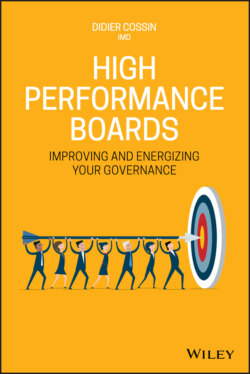Читать книгу High Performance Boards - Didier Cossin - Страница 19
CHAPTER 2 Governance Challenges around the World
ОглавлениеGovernance is the ability to take the right decisions at the top of organisations, and it is fast becoming a competitive differentiator. In an increasingly chaotic, rapidly changing environment, good governance is vital to giving organisations the resilience they need to withstand shocks. Governance drives organisations' efficiency, integrity, and social impact, all of which are necessary for sustainable success. Yet today, there are numerous examples of poor governance around the world, in the corporate, public, non-governmental, and inter-governmental domains.
The case of Volkswagen (VW) shows how a rift between the chair and CEO can result in major governance failures. In April 2015, VW Chair Ferdinand Karl Piëch, the 78 year-old grandson of Ferdinand Porsche (who founded Porsche), made the following comment to Der Spiegel without forewarning the board: ‘I am distancing myself from [VW CEO Martin] Winterkorn’. This caused tension among the board members, who began to speculate whether it would be the chair or the CEO leaving the company. VW's executive committee (as well as supervisory board member Wolfgang Porsche, also a grandson of Ferdinand) urged Piëch to soften his statement, and publicly reiterate his support for Winterkorn. Piëch agreed – allegedly on the condition that the committee recommend that he once again be elected chair of VW's supervisory board when his contract expired in April 2017.
Winterkorn, the company's CEO since 2007, had joined VW subsidiary Audi in the 1980s and had been hand-picked by Piëch, himself a former VW CEO. Piëch initially batted away suggestions that his wife Ursula might replace him at the head of the supervisory board, saying that the position was earmarked for somebody with an engineering background. A panel of six board members that had been established during the crisis concluded that ‘in the light of the past weeks, the mutual trust necessary for successful cooperation was no longer there’. Piëch, a representative of the family controlling 52% of VW shareholder votes, resigned from the supervisory board and was replaced by an interim chair.
This infighting was a red flag that foreshadowed the subsequent governance failure at VW. It also revealed the very human side of governance, with the frailties and flaws of the individuals involved.
Later in 2015, the cover up of VW's diesel emissions scandal was made public. The company had installed software in engines just so that they could pass laboratory emissions tests – a practice orchestrated at very senior levels of the organisation. The head of VW's US compliance team, Oliver Schmidt, had briefed executive management about the software in July 2015, and told them that US regulators were not aware of it. But he had been instructed to persist in the deception. NGOs in Europe and then in the US had suspected the problem much earlier than that, and it was apparently known about within VW for probably two years. The scandal led to an investigation and estimated costs of $18 billion. According to Alexander Juschus, director at German proxy advisor IVOX, ‘The scandal clearly also has to do with structural issues at VW . . . There have been warnings about VW's corporate governance for years, but they didn't take it to heart and now you see the result’.1
By 2019, the emissions scandal had cost VW roughly €28 billion ($31 billion). In addition, the US Department of Justice had appointed Larry D. Thompson, a former US Attorney General who worked on the prosecutions of Enron executives, to monitor the company. According to the VW website, Thompson would ensure that the Volkswagen Group was fulfilling the conditions of the company's settlement agreement with the US government. These include compliance-enhancing measures, reporting and monitoring mechanisms, and the implementation of an enhanced compliance and ethics programme at the company. Thompson would also be tasked with certifying that VW's compliance programme is able to detect issues such as that involving diesel emissions, and to prevent anything similar from happening again.
In 1920, the average lifespan of a company in the S&P 500 Index was 67 years – longer than average human life expectancy, which then stood at 54 years. But by 2010, things looked dramatically different. Whereas people's life expectancy had increased from 54 to 76, the average lifespan of S&P companies had fallen to just 15 years.2
There are of course much older businesses, some of them hundreds of years old, or even a thousand years in a small number of cases. But many of them are small businesses facing few competitive challenges, such as hotels, wineries, or funeral homes. By contrast, global firms that are more than 300 or 400 years old are extremely rare.
The strong process of natural selection in the business world has spread to non-governmental organisations – and possibly to government bodies as well. That process is probably at the heart of the success of the capitalistic market system. And in that world of accelerated natural selection, modern governance has become crucial to long-term success.
